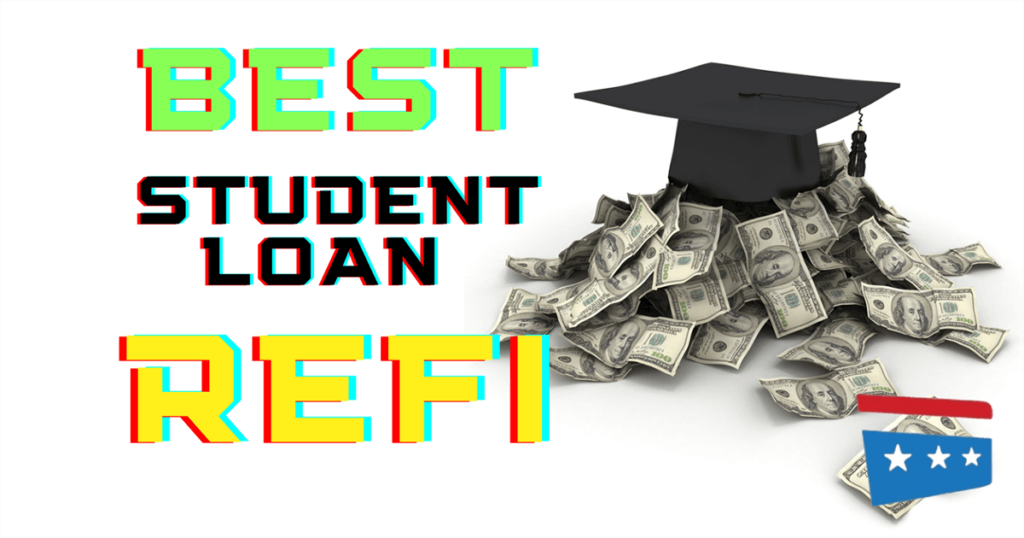Student loan refinancing can be an excellent strategy for borrowers looking to lower their interest rates, reduce monthly payments, or simplify their loan management.
With federal student loan debt reaching historic highs, many borrowers are seeking alternatives to their existing student loans.
Refinancing offers a way to consolidate existing loans into a single loan with potentially better terms, making it an attractive option for those who qualify.
However, refinancing student loans is not right for everyone. It’s important to weigh the pros and cons, and to consider your financial goals, credit score, and eligibility before making a decision.
In this article, we will explore the top 10 student loan refinancing options for 2024, diving into the key features, benefits, and drawbacks of each lender to help you find the best fit for your situation.
What is Student Loan Refinancing?

10 Factors to Consider Before Choosing a Loan Provider
Student loan refinancing involves taking out a new loan to pay off one or more of your existing student loans.
The new loan typically comes with a different interest rate, which could be higher or lower than the original rate, depending on your credit score, financial situation, and the lender’s terms.
The primary benefits of refinancing include:
- Lower Interest Rates: By refinancing, you may qualify for a lower interest rate based on your current credit profile, which can reduce your total loan cost over time.
- Consolidation: Refinancing combines multiple loans into one, which can simplify repayment by offering one monthly payment.
- Better Loan Terms: Depending on your financial situation, you may be able to secure more favorable terms, such as a shorter loan term or flexible repayment options.
However, there are risks involved, particularly for borrowers with federal student loans. Refinancing federal loans with a private lender will result in the loss of federal protections,
including access to income-driven repayment plans, forbearance, and student loan forgiveness programs.
Top 10 Student Loan Refinancing Options in 2024
Let’s explore the best refinancing options available for student loans in 2024, including details on loan terms, eligibility, and unique features that may make them the right fit for you.
1. SoFi
Best for High Loan Amounts and Member Benefits
SoFi is one of the most popular refinancing options due to its competitive rates, large loan limits, and unique member benefits.
Key Features:
- Loan Amounts: Refinance loans range from $5,000 to $300,000.
- Interest Rates: Fixed rates start at 4.99% APR and variable rates at 4.39% APR.
- Loan Terms: Terms range from 5 to 20 years.
- Eligibility Requirements: You’ll need a minimum credit score of 650, stable income, and a good debt-to-income ratio.
- Member Benefits: SoFi members get access to career coaching, financial planning, and networking opportunities.
Pros:
- Competitive rates for both fixed and variable options.
- No fees for application, origination, or late payments.
- Offers unemployment protection, where SoFi will temporarily pause payments if you lose your job.
Cons:
- Requires a good credit score and income to qualify for the best rates.
- Does not offer federal protections like income-driven repayment or loan forgiveness.
SoFi is an excellent choice for borrowers with strong credit who want both low-interest rates and added benefits such as career resources.
2. Earnest
Best for Customizable Repayment Plans
Earnest allows you to customize your repayment terms to fit your budget and financial goals, making it a strong option for borrowers who want flexibility.
Key Features:
- Loan Amounts: Refinance loans range from $5,000 to $500,000.
- Interest Rates: Fixed rates start at 4.40% APR and variable rates at 3.29% APR.
- Loan Terms: Choose terms from 5 to 20 years.
- Eligibility Requirements: Requires a credit score of 650 or higher, proof of income, and a minimum monthly income of $2,000.
- Unique Feature: Earnest allows borrowers to select their exact monthly payment amount, giving more flexibility in repayment.
Pros:
- Low-interest rates for those with strong credit.
- Flexible repayment terms and payment options.
- No fees for origination or prepayment.
Cons:
- Strong credit history is required to qualify for the lowest rates.
- Does not offer income-driven repayment options.
Earnest stands out for its customization options, which can make it a good choice for borrowers who want a more tailored approach to student loan repayment.
3. Splash Financial
Best for High-Interest Student Loans
Splash Financial offers some of the best interest rates for borrowers with high loan amounts, making it a great option for those with significant student loan debt.
Key Features:
- Loan Amounts: Refinances up to $500,000 for medical and dental professionals.
- Interest Rates: Fixed rates start at 4.40% APR, and variable rates start at 3.29% APR.
- Loan Terms: Offers terms between 5 to 20 years.
- Eligibility Requirements: Minimum credit score of 650, a stable income, and a good debt-to-income ratio.
Pros:
- Offers some of the lowest rates available for borrowers with large loan amounts.
- Special rates for medical professionals, including dentists and doctors.
- No fees for origination or prepayment.
Cons:
- Requires good credit to qualify for the best rates.
- Limited loan amounts for non-medical professionals.
Splash Financial is ideal for borrowers with large student loan balances, especially in the medical field, and offers competitive rates with no fees.
4. LendKey

Top 10 Universities with Best Online Programs
Best for Community Bank and Credit Union Refinancing
LendKey offers a unique opportunity to refinance student loans through a network of community banks and credit unions, often providing lower rates and better customer service.
Key Features:
- Loan Amounts: Refinancing amounts from $5,000 to $300,000.
- Interest Rates: Fixed rates start at 4.25% APR, and variable rates start at 3.04% APR.
- Loan Terms: Available terms from 5 to 20 years.
- Eligibility Requirements: Requires a credit score of 650+, proof of income, and a stable financial history.
Pros:
- Generally lower rates compared to larger lenders.
- Works with local community banks and credit unions, which may offer better customer service.
- No origination fees, application fees, or prepayment penalties.
Cons:
- Limited to borrowers with good credit and a stable income.
- Less flexibility in loan terms compared to some competitors.
LendKey is ideal for those who prefer working with community-based financial institutions and want competitive rates without the big-bank experience.
5. CommonBond
Best for Socially Responsible Refinancing
CommonBond stands out because it offers borrowers the opportunity to refinance their student loans while supporting social impact initiatives. It’s an excellent choice for those who want to make a difference while saving money.
Key Features:
- Loan Amounts: Refinance loans from $5,000 to $500,000.
- Interest Rates: Fixed rates start at 4.49% APR, and variable rates start at 3.29% APR.
- Loan Terms: Terms range from 5 to 20 years.
- Eligibility Requirements: Requires a credit score of 660 or higher and a minimum income of $24,000.
Pros:
- Offers competitive rates with strong social responsibility initiatives (each loan refinanced helps fund educational projects for children in need).
- No fees for application, prepayment, or origination.
- 100% remote application process, so it’s ideal for those who prefer online management.
Cons:
- Does not offer as many loan term customization options as some competitors.
- Requires a good credit score to qualify for the lowest rates.
For socially conscious borrowers, CommonBond offers the chance to refinance at competitive rates while contributing to meaningful global change.
6. Citizens Bank

Top 10 Universities for Student Satisfaction
Best for Multi-Loan Refinancing
Citizens Bank offers attractive terms for refinancing multiple student loans into one consolidated loan, ideal for borrowers looking for simplicity.
Key Features:
- Loan Amounts: Refinances from $10,000 to $300,000.
- Interest Rates: Fixed rates start at 4.49% APR, and variable rates start at 3.23% APR.
- Loan Terms: Available in 5 to 20-year terms.
- Eligibility Requirements: Requires a credit score of 700 or higher, stable income, and proof of graduation from an eligible school.
Pros:
- Offers multi-loan refinancing, simplifying multiple payments into one monthly payment.
- Competitive rates for borrowers with good credit.
- No fees for application or prepayment.
Cons:
- Requires a higher credit score than many competitors (typically 700+).
- No specific benefit or rate reduction for medical professionals.
Citizens Bank is great for borrowers who want to streamline their student loan management and have good credit.
7. Fora Financial
Best for Short-Term Loan Refinancing
Fora Financial is ideal for borrowers who want to refinance their student loans with a focus on shorter loan terms and fast funding.
Key Features:
- Loan Amounts: Refinances from $5,000 to $250,000.
- Interest Rates: Fixed rates start at **4.30% APR**, and variable rates start at *3.75% APR*.
- Loan Terms: Terms of 5 to 15 years.
- Eligibility Requirements: Requires a credit score of 650+, stable income, and a good debt-to-income ratio.
Pros:
- Fast approval process and quick funding.
- Low rates for short-term loans.
- Flexible loan terms and minimal fees.
Cons:
- Shorter repayment terms may result in higher monthly payments.
- Does not offer federal student loan protections like income-driven repayment.
Fora Financial is well-suited for borrowers who want fast funding and prefer short repayment periods to pay off their loans quickly.
8. Ascent

Top 10 Accredited Online Universities
Best for Borrowers Without a Cosigner
Ascent offers student loan refinancing options even for those who do not have a cosigner, which can be a game-changer for independent borrowers.
Key Features:
- Loan Amounts: Refinances from $5,000 to $200,000.
- Interest Rates: Fixed rates start at 4.50% APR, and variable rates start at 3.20% APR.
- Loan Terms: Terms range from 5 to 20 years.
- Eligibility Requirements: Requires a credit score of 650+ and the ability to demonstrate a stable income.
Pros:
- Cosigner-free refinancing is an option for independent borrowers.
- Offers low interest rates for those with good credit.
- No origination fees or prepayment penalties.
Cons:
- Requires good credit to qualify for the lowest rates.
- Limited loan amounts for non-medical professionals.
Ascent is ideal for borrowers who do not have a cosigner and are looking for a streamlined refinancing process without the need for additional financial support.
9. College Ave Student Loans
Best for Flexible Repayment Plans
College Ave offers a variety of repayment options, including interest-only payments during school and extended repayment terms, making it a flexible refinancing option.
Key Features:
- Loan Amounts: Refinances from $5,000 to $300,000.
- Interest Rates: Fixed rates start at 4.99% APR, and variable rates start at 3.23% APR.
- Loan Terms: Offers terms from 5 to 20 years.
- Eligibility Requirements: Requires a credit score of 650+, proof of graduation, and a stable income.
Pros:
- Variety of repayment options, including deferred and interest-only payments.
- Competitive interest rates.
- No fees for prepayment or late payments.
Cons:
- Higher APR for variable-rate loans.
- Requires good credit to get the best rates.
College Ave is a good choice for borrowers who want flexible repayment options and competitive rates.
10. Discover Student Loans

Best for Customer Service
Discover is a well-established lender offering reliable student loan refinancing options with excellent customer service and support.
Key Features:
- Loan Amounts: Refinances from $5,000 to $300,000.
- Interest Rates: Fixed rates start at 4.49% APR, and variable rates start at 3.24% APR.
- Loan Terms: Terms range from 5 to 20 years.
- Eligibility Requirements: Requires a credit score of 650+ and proof of income.
Pros:
- Excellent customer service and online tools.
- Offers discounts for automatic payments.
- No application or origination fees.
Cons:
- Higher credit score needed to qualify for lower rates.
- Does not offer federal student loan protections.
Discover is known for its strong customer support and user-friendly services, making it a good choice for those who value assistance throughout the refinancing process.
Conclusion: Which Student Loan Refinancing Option is Best for You?
Choosing the best student loan refinancing option depends on a variety of factors, including your credit score, income, loan amount, and financial goals.
While all the lenders mentioned offer competitive rates and terms, your ideal lender will depend on what you prioritize most—whether it’s lower rates,
flexible repayment options, or specific features like social responsibility or customer service.
Before refinancing, be sure to understand the trade-offs involved, particularly if you have federal student loans.
Refinancing federal loans with a private lender means losing access to benefits like income-driven repayment, forbearance, and loan forgiveness programs.
If you’re unsure about refinancing or need additional guidance, it’s wise to consult a financial advisor.
Refinancing student loans can be a powerful tool for lowering your interest rate and simplifying your payments—just make sure it’s the right financial decision for your unique situation.
1. What is student loan refinancing, and how does it work?
Student loan refinancing is the process of taking out a new loan to pay off one or more existing student loans. The new loan typically comes with a different interest rate, which could be lower or higher depending on your financial profile and the lender’s terms. Refinancing allows you to consolidate multiple loans into one, making it easier to manage repayments. However, refinancing federal loans with a private lender means losing access to federal benefits such as income-driven repayment plans or loan forgiveness programs.
2. Who is eligible to refinance student loans?
Eligibility for refinancing varies by lender, but most require:
- A minimum credit score (usually around 650 or higher).
- A stable income and a good debt-to-income ratio.
- Graduation from an eligible school (some lenders may require a degree, while others don’t).
- Proof of employment or an employment offer (for recent graduates). Borrowers who have federal loans should also be aware that refinancing will result in the loss of federal protections and benefits.
3. Should I refinance my federal student loans?
Refinancing federal student loans can be a good option if you have strong credit and want to secure a lower interest rate or consolidate your loans. However, refinancing federal loans with a private lender means you will lose access to important benefits like:
- Income-driven repayment plans.
- Federal student loan forgiveness programs (e.g., Public Service Loan Forgiveness).
- Temporary forbearance or deferment options. Before refinancing, carefully evaluate your financial goals and whether you are willing to forgo these federal protections.
4. Can I refinance both federal and private student loans?
Yes, you can refinance both federal and private student loans through most refinancing lenders. Refinancing allows you to consolidate these loans into one, potentially lowering your interest rate and simplifying your monthly payments. However, it’s important to note that refinancing federal loans with a private lender will result in the loss of federal benefits and protections, such as income-driven repayment and loan forgiveness programs.
5. What are the risks of refinancing student loans?
While refinancing can offer lower interest rates and simplified payments, there are risks to consider:
- Loss of federal benefits: If you refinance federal loans with a private lender, you lose access to income-driven repayment options, forbearance, and loan forgiveness programs.
- Higher interest rates: If you don’t qualify for the best rates due to a lower credit score or other factors, refinancing could result in higher rates than your current loans.
- Limited flexibility: Some lenders may have stricter eligibility requirements or fewer repayment options compared to federal loans.
Make sure to assess the pros and cons of refinancing and consider alternative solutions like income-driven repayment or consolidation before making a decision.